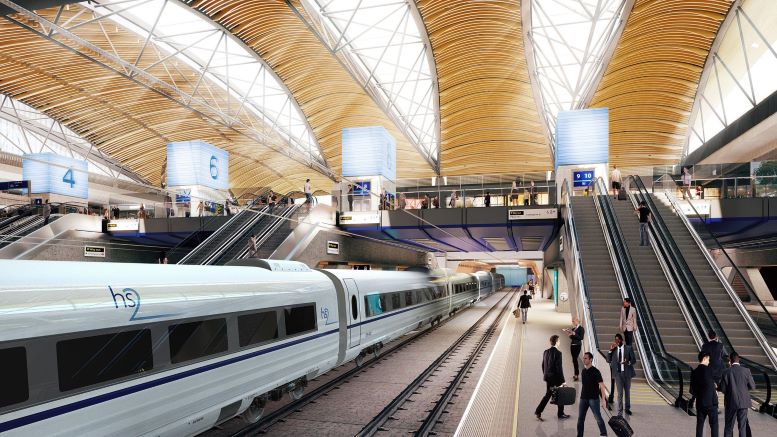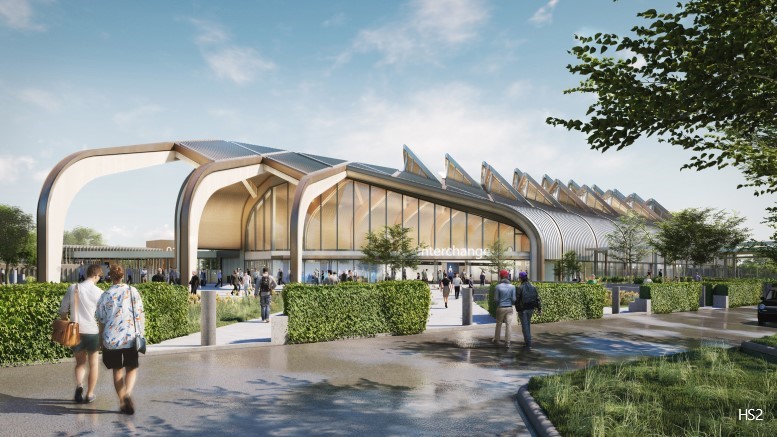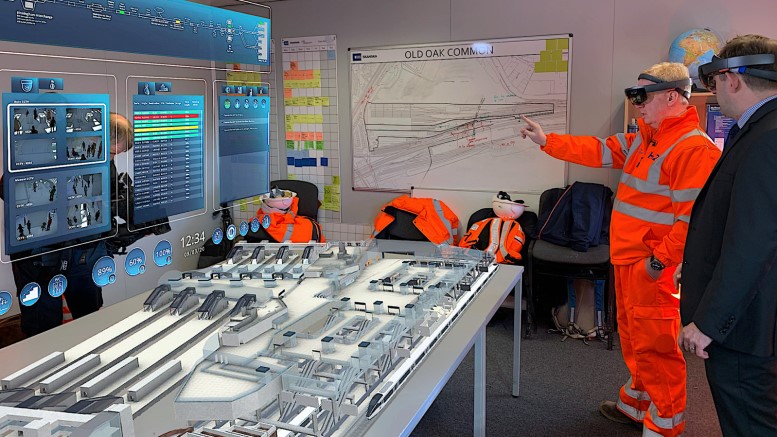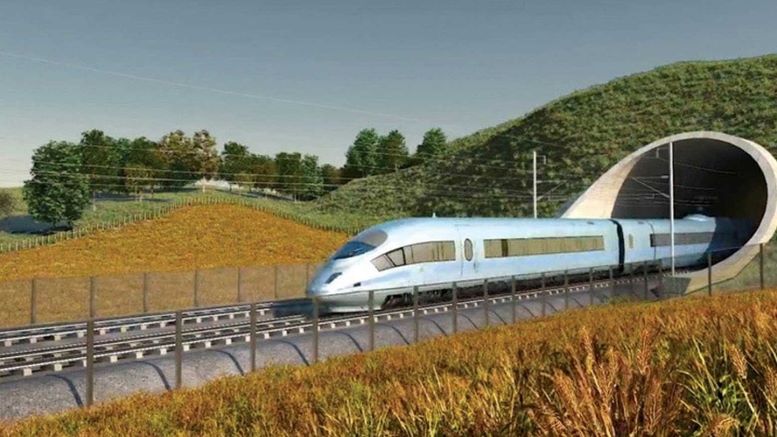
Lord Berkeley, who was formerly deputy chairman of the government-commissioned Oakervee Review into the future of HS2, has published his own report evaluating the project’s status and making suggestions for its future.

In his report, Lord Berkeley argues that HS2 is the wrong solution to the challenges of improving rail services in the Midlands and North, and that there are alternatives which are cheaper and quicker to implement and can provide commuters in these areas with better daily services. He claims that improvements to the lines to and from London can be delivered without building a new line and causing untold damage to businesses and residents as well as the environment.
Launching his ‘Dissenting Report’, Lord Berkeley stated: “It is my belief that there is overwhelming evidence that the costs of the HS2 project are out of control, the benefits are overstated and that it potentially will not be delivered to Leeds and Manchester for another 20 years.
“There is also substantial evidence of poor project management and governance, and no sign that this problem will be resolved by the public bodies responsible for its delivery to give stakeholders and Government comfort that it is wise to spend over £100 billion on one railway project.”
Lord Berkeley has issued his own report as he claims that he was prevented from attending important meetings during the Oakervee Review, chaired by former HS2 chairman Douglas Oakervee, which restricted his ability to carry out his role as deputy chairman effectively. Following a leaked draft of the Review’s report, Lord Berkeley collated and evaluated all of the evidence available to him and produced his own report.
Background
HS2 – the plan to link London with Birmingham, Manchester, Leeds and the North by a completely new, high-speed railway line – has been dogged by controversy almost from the day the idea was launched.
First there is the cost, which has steadily increased from around £25 billion in the early days to over £100 billion now.
Then there is the ‘not in my backyard’ (NIMBY) attitude of those along the route, who understandably view their own private lives as more important than the nation’s transport network.
The total opposite of this is the ‘why can’t we have it too?’ approach – Welsh members of parliament have voted against it as it doesn’t, in their perception, do anything for Wales and therefore nobody should have it.
Calling the new railway High Speed Two (HS2) has caused its own problems. The whole premise of the project is to get long-distance passenger traffic off the existing – and full – West Coast main line, therefore freeing up more train paths for local trains, commuters and freight.
So, in reality, this is the ‘West Coast main line capacity enhancement programme’. Calling it that, or perhaps WCMLCEP for short, would not have attracted so much attention. It would be a new line – a by-pass – to create extra capacity. Additional lines couldn’t be built alongside the existing ones, that would mean flattening large portions of Rugby, Coventry, Birmingham and Wolverhampton, so a new route was needed to by-pass the congested areas. And as railway lines tend to last for 100 years or more, then it should be built to the latest standards, and so be capable of supporting very-high-speed trains.
Naming it High Speed Two just fuelled the flames as it suddenly became all about fat cats from Birmingham getting to London five minutes faster, rather than the actual aim which was to make sure that ordinary travellers from the Midlands and the North could get to London by train AT ALL.
All the negative reaction didn’t help the budget either. To appease the NIMBYs, Tory backbenchers and various councils and pressure groups along the way, more and more of the route was planned to go underground – in tunnels and deep cuttings. Surprisingly, this put the costs up!
The trains were not included in the original cost estimates. These would be bought by banks and finance houses and leased to the operators, so wouldn’t cost the government anything. The maintenance depots, too, would be financed by the train manufacturer and included in the lease arrangements.
However, the detractors insisted in adding these costs to the total bill, inflating it and making the picture look worse.

All this brought unfair comparisons with the cost of building high-speed lines in other countries. One construction company representative, involved in the French TGV programme (Train à Grande Vitesse, literally high-speed train), couldn’t understand why it was so expensive in the UK.
“In France,” he said, “we build our high-speed lines up on embankments so that passengers get a good view and the public can see our iconic trains speeding past.” Once it was explained that HS2 would be more like an underground railway than a TGV high-speed line, he could see the cost implications. But he still couldn’t understand the concept. Why hide this marvel of technology away from view? The British public should be proud of their technological achievements and WANT to see the trains go past.
As a result of all this, the perceived cost of the HS2 programme has been going up and, unsurprisingly, the cost:benefit ratio has gone down. It is almost a self-fulfilling prophecy, one in which the objections raise the costs and then make the objections more of a reality. One solution would be to take away the below-ground ‘solutions’, revert more to the French low-cost above-ground model, and the cost benefits would then improve.

It is just this muddle that the Oakervee Review into HS2 was to try and unpick, answering the question “Is HS2 good for Britain?” It was to have been released in November 2019. However, with a General Election taking place, the government decided to sit on it.
A draft version was leaked to the press and reportedly supported continuing with the project, despite the cost increases. But the full report still (5 January 2020) hasn’t been released.
And now the deputy chairman of the review panel, Lord Berkeley, has released his own report. In it, he concludes: “HS2 is the wrong and expensive solution to ‘making it faster and easier to travel for work and leisure’ by providing better North-South intercity services. Many more people travel to work and leisure on local or regional services, and those in the Northern Power House (NPH) and Midlands Connect (MC) areas are some of the worst in the country.
“There is strong evidence that the greatest need and demand for improved rail services is within the regions, in particular the NPH and MC areas, since services to and from London are of better quality, and that HS2, apart from its Northern end within the NPH area, does not help this much. Its stated aim of providing better North-South links is just as likely to attract more jobs from the regions to London than the other way round.”
Unfortunately, the public still can’t judge Lord Berkeley’s comments and claims against those of the ‘official’ review, which Rail Insider understands will be published ‘shortly’.

However, the rail industry has been making its own views clear. Darren Caplan, chief executive of the Railway Industry Association, said: “Let us be clear: HS2 is vital for the UK as it seeks to boost its transport infrastructure for the whole country in the coming decades. It will provide much greater capacity by taking traffic off the current rail network, and transform connectivity between economic centres, cities, towns and communities.
“It is already generating thousands of jobs, and billions of pounds and GVA in investment and economic growth across the country, and will do even more in the coming months and years as the project gets delivered. What’s more, as studies into HS2 have found, its benefits have been significantly undervalued, with forecasts of 500,000 extra jobs and 90,000 homes created around HS2 stations in the years ahead.
“We urge the Oakervee Review to publish swiftly and the Government to proceed with the project as soon as possible, to make the benefits of HS2 a reality, for the benefit of passengers, communities, and UK plc more widely, its economy and connectivity.”
Despite Lord Berkeley’s suggestion that the Midlands Connect area would benefit from other solutions to the capacity problem, Midlands Connect director Maria Machancoses strongly disagrees. “Lord Berkeley’s suggestion that the government should consider building only small sections of HS2 in the north of England shows a disgraceful ignorance of how important the scheme is to the Midlands,” she said. “Our region of more than ten million people stands to benefit the most from HS2, yet we are consistently squeezed out of the debate. HS2 must be delivered in full.

Midlands Connect.
“Contrary to Lord Berkeley’s view that the benefits of HS2 have been overstated, I believe firmly that they have been vastly underestimated. During the official Oakervee Review, Midlands Connect and our partners submitted swathes of compelling new evidence showing that integrating HS2 with existing networks can bring vast improvements to journeys for millions of people.
“HS2 is the best way of levelling up the country and unleashing our potential. There are no ‘shovel ready’ alternatives that could transform our rail network in the same way, provide the extra capacity we so desperately need and contribute to our low-carbon transport future.
“It is disingenuous to suggest that the government could upgrade existing lines in the Midlands and the North without HS2. Our £3.5 billion Midlands Engine Rail proposals are fully integrated with HS2, as is Northern Powerhouse Rail, and we have said repeatedly that neither scheme can be fully realised without delivering HS2 in its entirety.
“We will continue to make the case for HS2 until it is secured in full. It is time to get on with delivering the infrastructure the Midlands and the North so desperately needs, and we look forward to working with our partners and the new government to make it happen.”





Be the first to comment